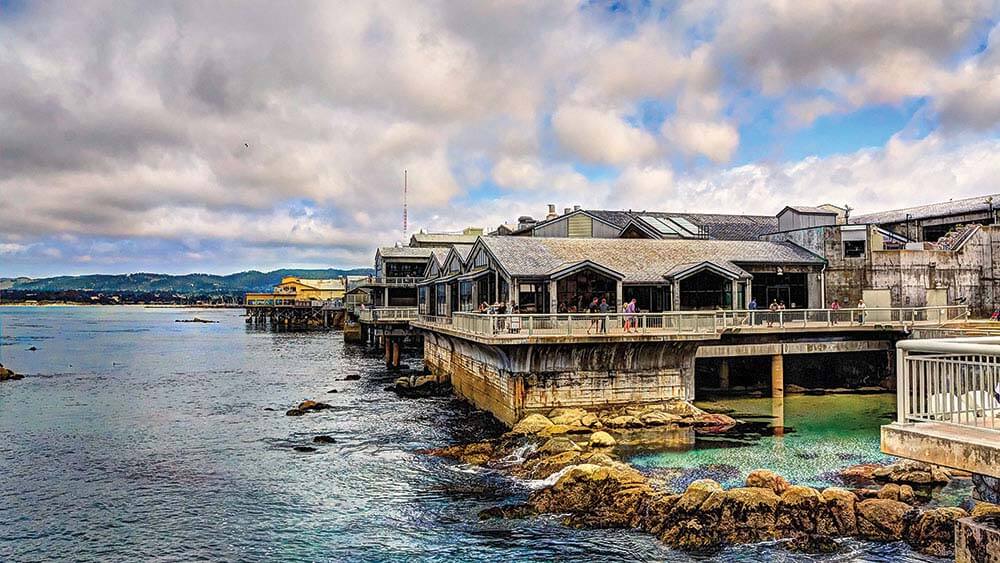
Monterey Bay Aquarium’s plastic-free efforts led to some of their toy vendors changing their product design. One company replaced the plastic eyeballs on plush animals like penguins with sewn-in eyes.
The campaign to eliminate single-use plastic from the Monterey Bay Aquarium, which hosts corporate and group events, began with a conversation in its gift shop in 2016. The conversation was between Kera Abraham Panni, who is now senior outreach manager for the aquarium’s conservation and science team, and Andrew Fischer, now vice president of sustainability and conservation for SSA Group, a Denver-based company that partners with cultural attractions across the U.S., providing food-and- beverage, retail, and admission services. Panni was reflecting on the amount of plastic packaging that could be found on the gift shop’s shelves at the aquarium.

Lura Midgal
An estimated 12 million tons of plastic waste now makes its way into the ocean every year. In light of the aquarium’s mission to inspire ocean conservation, Panni saw both the need and the opportunity to act as an example for visitors by reducing the amount of plastic in the store. Fischer agreed. SSA’s initial step was to conduct an audit of the shop’s inventory of more than 4,000 products — everything from snack and drink packaging to postcards, souvenirs, and toys — to see where they could eliminate plastic.
The first piece of the puzzle was exactly that: puzzles. SSA reached out to toy suppliers, asking vendors to find alternatives to the plastic shrink-wrap that covered puzzle boxes, said SSA’s Lura Migdal, retail and culinary general manager for the aquarium. “Some of them said ‘yes,’” Migdal said, “and some of them said ‘no.’”
In some cases, they had to find new partners, but some vendors changed how they did business and found plastic-free solutions. It was a years-long process filled with trial and error, but earlier this year, SSA and the aquarium announced that the retail store had eliminated single-use plastic.
Making Waves
As noteworthy as that accomplishment is, changing one gift shop in one aquarium might seem like a drop in the ocean. The initiative, however, spread from Monterey throughout SSA, which has contracts with more than 75 cultural attractions across the U.S., serving approximately 50-plus million visitors each year. Changing the supply chain, not just the practices of an individual venue, has a much wider impact, Migdal said. “We don’t want [the packaging] to be just changed for us,” she said. “We want it to be changed for the world.”
Along with the changes in product packaging, SSA had increased its sustainability efforts in the food and beverages served at the aquarium’s café and at special events held at the aquarium, where SSA is the exclusive caterer.
Virtually all plastic packaging has been eliminated from the café and catering services, including juices, sodas, yogurt, and to-go food containers. SSA also worked with the supplier to eliminate the plastic cellophane that once came with linen deliveries and devised a system in which the deliveries come unwrapped in reusable storage containers, Migdal said. “It changed here, but it also changed [the supplier’s] way of doing business with their other customers, which is what really made that difference.”
Their efforts have had an impact in the Monterey hotel and event community, Migdal said. The larger hotels in proximity to the aquarium have replaced plastic water bottles with aluminum, as has the Monterey Conference Center.
SSA group “is not a huge company, but as we make changes with our partners we can be the leader — the ones who say that other food service companies or retail companies can make this change too,” she said. “We don’t want to be the only ones in the world making change. We encourage everyone to make change. And to show that it can be done and we’re not losing money. We’re thriving.”
RELATED
- Read “A Sea Change for Event Sustainability”
- Learn more about sustainability efforts at the Monterey Bay Aquarium.
Turning the Tide on Plastic
At the Los Angeles Convention Center (LACC), a ban on the sale of single-use plastic bottles was an obvious step, according to Ellen Schwartz, LACC’s general manager. “The long-term cost of single-use plastic to our environment was something we could no longer ignore.” LACC announced on Earth Day that going forward, Levy Restaurants, which provides LACC’s catering and other F&B services, would offer refillable aluminum bottles in lieu of plastic. The center also maintains 21 “hydration stations,” where the aluminum and other water bottles can be refilled. To date, the water-refilling stations have saved an estimated 150,000 plastic bottles.
Barbara Palmer is deputy editor at Convene.
